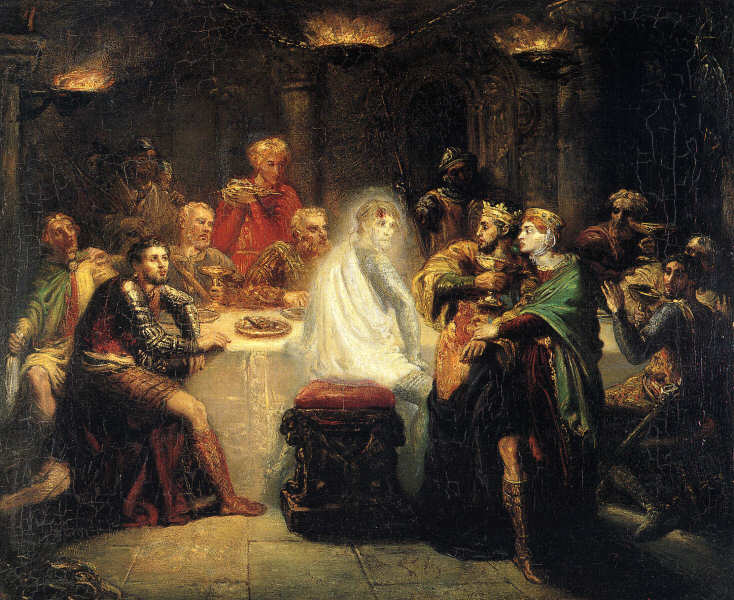Will We Die Only to Live Again
Is there life | later on decease?
Scientific discipline suggests 'no' only maybe these kind of things are beyond what we can prove? Besides, don't some people live on through what they contribute and notice? This needs some more thought…
At what moment are you dead?
Humans have ever been fascinated with death and the idea of coming back to life. But is it really possible to come back from the dead? And what's the divergence between a living animate being and a expressionless body anyway? Randall Hayes delves into the scientific theories that seek to answer these age-old questions.
Deathly stats - make your life or death decisions!
Preparing for death – rituals from dissimilar cultures
The only certainty in life is death. For centuries, humans take been trying to discover means to come to terms with this, which might explain why many believe in an afterlife. From ancient tribes to the modern Western earth, people take of import rituals and beliefs around death…
More
What is death?
Information technology may seem strange to ask this only the start question we demand to accost is what death actually is, says Dr Jonathan Jong from the Institute for Cognitive and Evolutionary Anthropology, University of Oxford. "In that location are rituals around death that tin vary enormously across different cultures but there can likewise be unlike definitions of what death is. Even in scientific communities, there is not complete understanding on this."
So is death the brain or the centre stopping? What near if someone has a concluding illness and parts of their bodies dice before they do as organs close down and finish working? "When you lot starting time to call back nearly this beyond different cultures, the question gets even bigger. For example, in some parts of Indonesia, families dig upward the bodies of their dead relatives and rebury them. They speak of a person not being properly dead until the 2nd burying. For them, death comes in stages," says Dr Jong.
Caring about a dead torso
In some parts of Tibet, corpses are left on a mountain rather than buried. For some, this may sound rather heartless. "But when you recollect how difficult it is to carry a dead body up a mountain, it becomes articulate that it'south a deliberate and meaningful deed," says Dr Jong.
Similarly, in Ancient Persia (at present Islamic republic of iran) some tribes like the Zoroastrians, used to build towers of silence where they placed their dead to exist eaten by birds. "Again, at starting time glance, this may wait to united states of america like cavalier (casual) abandonment, simply there is nothing condescending nearly building costly structures just for the expressionless," explains Dr Jong.
All cultures care about dead bodies but they care in different means. Perhaps some people might think dressing a corpse - even performing cosmetic surgery on information technology as American undertakers are often expected to practice - is strange? Increasingly in the Britain too, dead bodies are drained of their natural fluids and filled with embalming liquid to preserve them. These practices may seem normal to us, but bizarre to others.
How we feel nearly decease
Rituals may take evolved to help united states deal with expiry. We need these rituals, says Dr Jong, because our feelings nigh death can exist ambivalent (mixed). "We've evolved to avoid concrete threats, which is partly why corpses repulse the states. Non but practice they represent reminders of our mortality, only tin can likewise exist sources of infectious disease. We are therefore torn between needing to dispose of a corpse that might conduct germs and wanting to concur on to the body that is nevertheless recognisable as belonging to someone nosotros take known and loved. This contradiction may be why we surround death with pomp (dramatic displays) and ceremony. A funeral means we aren't but disposing of a corpse as if information technology were nothing. We're saying bye to grandpa. Nosotros still see him as a person. That's the kind of explanation evolutionary anthropologists requite, anyway."
A skilful death?
There is little show that the question of what a skilful decease is occurred in early human hunter-gatherer societies. It is something that developed culturally over time. There is certainly a long Western tradition of thinking about this, starting as far back as the ancient Greek philosophers. In the European Eye Ages, the Church even used to publish manuals for dying well, chosen ars moriendi, the art of dying.
Over the centuries, at that place is less reliance on the Church as a atypical establishment, and so expiry was, like so many things, privatized, and people had to brand their own judgements nigh how to die well.
"Every bit y'all would imagine, most people when asked about what a good death is say they don't want hurting or loss of control. It'southward become the dominant idea in the West that people should face death bravely, which is not unlike how the ancient Greeks thought about expiry. But why should people exist brave and accepting of the end of their lives? Isn't in that location something to exist said for 'raging confronting the dying of the low-cal' (poet, Dylan Thomas)? This is why some in the hospice movement (which helps people at the stop of their lives) question the very idea of a good death. Good for who?" asks Dr Jong.
Believing in life after death
The belief in an afterlife runs psychologically deep and probably comes from our intuitions about the human relationship between bodies and minds, Dr Jong adds. He points to the work carried out by Bruce Hood, a professor of Psychology at Bristol University.
Bruce Hood and his colleagues ran studies on pocket-size children anile around four to five. He showed them a hamster then said he could clone an verbal replica. When asked if the cloned hamster shared the same concrete traits as the original, the children generally said 'yep'. But when asked about the psychological traits of the clone (eastward.chiliad. "Does this hamster know that y'all amused him"?), they more oft said 'no'.
In another fix of experiments by Jesse Bering and colleagues, children were told well-nigh a mouse that had been eaten by an alligator. When asked near the mouse'south biological traits, like 'Does his brain withal work?' or 'Is he all the same hungry?', the children typically said 'no'. Just when asked about the mouse'south feelings like 'Is the mouse still scared of the alligator?', they more ofttimes said 'yes'. And so it would seem that the children thought your biology ends when you die merely some of your psychology lives on. This was true regardless of whether the children were brought up in religious or secular (non-religious) homes.
It'due south oft assumed adults tell children what to think. But enquiry by people such as Hood and Bering suggests that children naturally develop these beliefs, and sometimes keep them as adults.
This basic and deep-seated idea, that our minds - our memories, our emotions, our desires - are somehow distinct and separate from our bodies is what enables us to believe that while our bodies might die, we might somehow still go on, perhaps as immaterial souls.
Soothing belief in the afterlife
Some people find belief in an afterlife very soothing. It can assist with grief, loss and sadness. Information technology's comforting to think that one day we'll be reunited with a loved one who's died, in a globe better than this 1. Peculiarly for people who take a very harsh life, thinking it will be better later on expiry can aid. For case, African-American slaves often sang songs most the afterlife to soothe their brutally cruel existence.
It is a small-scale step from believing that humans consist of bodies and souls to believing in an afterlife, and a smaller step from that to believing in a pleasant afterlife in which we are reunited with our loved ones. Not all afterlife beliefs are pleasant, just they often are. Plus, "Information technology'southward not just the traditionally religious who possess afterlife behavior," adds Dr Jong. "For as religious behavior are declining in countries like the UK, belief in heaven declines much more slowly. God goes, but sky remains."
And there are other ways that nosotros keep the expressionless live, without literally believing in sky. By talking about someone who has died, looking at photos and films of them, and peradventure even "talking" to them, nosotros keep them alive in our minds, memories, and hearts. So in this sense, at that place is life afterwards expiry.
Is there life afterwards death? What world religions say…
- A question with 2 possible answers
-
If you ask a biologist what happens to yous after death, they will probably tell you all in that location is to know about what happens to your body subsequently your centre stops chirapsia. But is that really a total answer to our Big Question? By life after death, don't nosotros mean something different than biological or natural life? The major world religions have generally answered this question in 1 of two ways:
Reply one: Sky and hell
The 3 Abrahamic religions – those that recognise Abraham as their first prophet (Christianity, Judaism and Islam) – all reply this question in a like way. They say that yous are non simply your body but you are too your soul. After the death of your body, your soul lives on in a world across the physical world.Answer 2: Rebirth
The major eastern religions (Hinduism, Buddhism and Sikhism) also teach that there is something almost you that survives the death of your body. It does not leave this globe though. Instead, information technology finds another body to become live in. We phone call this movement from body to body, reincarnation or rebirth (Saṃsāra).
-
- Christianity
-
On the footing of the New Attestation - which tells u.s.a. how Jesus died and returned to life - Christians hope that God will give them a new and eternal life after death. They also believe that at some point, their lives will be judged by God. Those who have put their faith in Jesus will become to heaven and those who take rejected him will go to hell. Hell is often depicted as a place full of pain and suffering. But it shouldn't be taken too literally. Suffering ways the anxiety we feel when we are doomed to an eternal life without God - the creator of life and all that is skilful – by our side. In the aforementioned way, heaven is not a place high up in the sky. It is where we are reunited with God, the source of our life.
-
- Islam
-
Because Islam and Christianity both worship the God of Abraham - Allah being the Arabic word for God – these two religions understand the afterlife in a similar way. Similar Christians, Muslims call up that we have a soul that survives the death of our torso. And the thought that there will be a day where God judges humanity is one of the six core behavior in Islam. On this day, everyone will either be sent to paradise (Jannah) or hell (Jahannam). The faithful go to paradise, which is depicted as a garden with seven layers of heaven The summit one is the garden of Eden and home to Adam and Eve. Whilst in the lower ones, your neighbours will exist people like Jesus and Abraham. Hell as well has vii layers, each with a different punishment for a different class of sinner. But this punishment isn't necessarily eternal, like in Christianity. Information technology is possible that afterwards serving their judgement, a sinner is welcomed into paradise.
-
- Judaism
-
The Hebrew Bible – the earliest Jewish texts – is not entirely articulate when it comes to the question of the afterlife. There is an underworld called Sheol. Only this is not the hell of Christians or Muslims. It is where all dead people go – whether they lived a good life or not – to spend eternity as a shadow of themselves. In that location is no punishment or suffering here, but neither is information technology the home of God. The later texts of the Talmud develop the more than familiar ideas of judgement, hell (Gehenna) and heaven (Olam Ha-Ba). On the day of judgement, those who followed the laws of Judaism movement from this world (Olam Ha-Zeh) to the world to come (Olam Ha-Ba). This is the garden of Eden where God'due south throne stands. Merely Gehenna is dwelling to most ordinary people. Here they'll be either be punished or cleansed – depending on which scriptural scholar you ask – for a menses of twelve months at most. After this period, they'll be fix to bring together God. But the truly evil – once again depending on which scriptural scholar you ask – will accept to spend eternity in hell or exist completely destroyed.
-
- Buddhism
-
The Buddhist tradition is different from the iii religions described above in two key ways. First, after death you don't go to some other globe but stay in this one. When your trunk dies, you lot are reborn in a different ane. Secondly, there is no self or soul, there is no yous. Confused? Don't worry, let's delve deeper... If in that location is no soul or self, what is in that location to be reborn? According to the Buddha, your sense that you are the same person throughout your life is an illusion. For Buddhists, everything is always changing, nothing is permanent. So when you die, not you just the energies that shape you take on a new form. The $.25 that made yous you, are bundled slightly differently and form someone else. This side by side life is continued to your previous one through something chosen karma. This is the thought that an activeness in a previous life has a reaction in the side by side. Did you lot practise something horrible in a previous life? Yous might be reborn as a cockroach! The ultimate goal of Buddhism is to escape this cycle of rebirths by reaching enlightenment or Nirvana.
-
- Hinduism
-
Similar to Buddhism, Hinduism likewise sees life as a bike of death and rebirth connected by karma. If you have bad luck in this life, y'all must have done something wrong in the previous one. To interruption costless of this cycle is again the goal. Hindus call this state of freedom moksha. Merely unlike Buddhists, Hindus practise believe that at that place is something that makes you, you. They believe that every person has an atman, a soul or spirit. This spirit is always the same, no matter what torso it is temporarily living in.
-
- Sikhism
-
Just similar Buddhists, Sikhs believe that life is a bicycle of death and rebirth connected by karma. The goal is again mukti, or the freedom from this bicycle. Just like Hindus, Sikhs believe that there is a soul that is passed forth in a series of rebirths. As you may change into a dissimilar set of clothes, so as well your soul is reborn in a new body. Sikhs attain mukti when the soul becomes one with God. The soul originally came from God, but has been separated from him. Because of this it has get impure. Just through remembering and meditating on the name of God, the soul tin can observe its way back.
-
- Chinese folk faith
-
Chinese folk organized religion'due south understanding of the afterlife also centres effectually the rebirth of souls. However, If yous have sinned in your previous life, you lot are non just reborn in an uncomfortable trunk in the next. Instead, your soul first goes to hell or Diyu. Souls are taken to this secret labyrinth so they can be punished for their sins. Once they take received their punishment, they are ready to be reborn in a new trunk. All volition have to spend some time here, but how long it takes before y'all are allowed to enter a new body depends on how serious your sins are.
-
Henrietta Lacks was an African American woman whose cancer cells became the first immortal homo cell line. Her legacy has made medical history saving lives but all without her knowledge.
Henrietta Lacks was an African American woman whose cancer cells became the get-go immortal human cell line. Her legacy has made medical history saving lives but all without her knowledge.
Life after death: the big questions in philosophy
It's pretty natural to want to know whether there's life later death and to actually desire there to be life after death. That's considering many of us assume that expiry is a bad thing - something to be feared. Simply not anybody. Some philosophers have argued that decease isn't such a big deal after all...
More
Suppose for a moment that there'southward no life after death and that when you die, that's it. Some philosophers would enquire: is information technology bad to be expressionless?
Now, it's important to add that nobody denies that dying, the process that leads to death, can be unpleasant. When philosophers say that death isn't an ill or that decease is no impairment to the one who dies, they aren't denying the suffering that some people confront. Instead, what they're suggesting is that the state of being dead isn't actually a bad one.
So who would say such a thing? And why?
The thought that death isn't bad is associated with the Greek philosopher Epicurus (341-272 b.c.e) and his followers. He realized that many of us fright death, just he thought this fear was irrational. He offered arguments for this determination, which he hoped would put people's minds at ease.
The offset ane goes similar this… If death is bad, for whom is it bad? Well, it'south hard for those left behind, merely we aren't worrying near them in this instance. Nosotros're talking primarily virtually it existence bad for the i who is dead. But, Epicurus says, that doesn't brand sense. Expiry is anything (the ultimate end of everything). At a minimum, for something to exist bad for someone, the person has to exist. Remember of information technology like this: Epicurus has been dead for a long time. Information technology wouldn't be very dainty to stride outside and shout, "Epicurus was a crazy old philosopher!" But would this annotate be bad for Epicurus himself? It's hard to meet how it would be as he isn't around to have his feelings hurt. And so if death really is the end of everything you lot can experience, this suggests that when you're dead you aren't around to feel anything unpleasant. And so being dead isn't bad.

However, not anybody is convinced by Epicurus' reasoning. Some philosophers argue that Epicurus went incorrect because he had a mistaken picture of what it is for something to exist bad for someone. He assumes that something is bad for someone but if they have a negative experience similar to how if a bee stings you, you're very likely to feel discomfort. But is in that location another way for things to exist bad, another fashion that a person can be harmed?
The American philosopher, Thomas Nagel argued that there is. For case, suppose that all of your friends throw a party only they don't invite you. And somehow they manage to keep information technology a complete secret from you. Was it bad for you that you weren't invited?
You never notice out about the party so yous don't have any negative feelings or pain considering of information technology, so in this sense, some would say this isn't necessarily a bad state of affairs. But others would advise that you were harmed by not being invited because yous missed out on all the good things that come with a party (e.g. having fun, coming together new people etc.)
And Nagel thinks that this can explain why we think that death is bad. It's not because nosotros think that information technology will exist unpleasant to exist dead, simply considering expiry deprives usa of the good things that we would be able to practise and enjoy if nosotros hadn't died.
Life before birth
Epicurus' follower, Lucretius (99-55 b.c.e.), a Roman philosopher and poet, offered a different argument known as "the Disproportion argument". This tin be best explained by thinking about the fourth dimension before you were born…You were born at one detail time, and non earlier. If you had been born earlier, then you could've enjoyed things during that earlier time. Simply not many people believe that it's a bad thing that they were deprived of the time before their birth. Yet, in all the relevant respects, the time earlier your birth and the time after your decease are the same. Both extend out toward infinity and neither includes you lot. So if yous don't mind having missed out on one, surely yous shouldn't mind missing out on the other?
What mattered most to Epicurus and Lucretius was disarming people to let become of their fearfulness of death. If decease causes you no hurting when you're dead, and then it'south a mistake to let it cause you hurting when y'all're alive. Instead, they were hedonists, who idea what mattered in life was pleasure. Rather than worrying about our death we should "eat, potable, and be merry", as the saying goes.
What exercise you retrieve? Which Philosopher has the about compelling argument from your point of view?

vi of the spookiest ghost stories
- A playful prankster
-
Although Peeves (a troublesome poltergeist) was left out of the Harry Potter film series, he plays a prominent office in the books. The name 'poltergeist' is German in origin, and roughly translates as 'noisy ghost'. The story goes that Peeves has lived in the Hogwarts castle since it was founded in 993. Poltergeists commonly appear in places where lots of young people are living, and given how humming Hogwarts was with students, Peeves was noisier, more than destructive and harder to expel than the average poltergeist. He's known to cause a lot of havoc for the school caretaker past smashing vases, messing upwardly potions and toppling bookcases, to proper noun a few misdeeds. Not many at Hogwarts can control Peeves, but he'due south been known to respect young man pranksters, like Fred and George Weasley, and is deathly afraid of the Bloody Baron, the Slytherin ghost.

-
- An Irish trickster
-
The Murphy family lived in a remote cottage in Cooneen in County Fermanagh in Ireland. In 1913, shortly afterward Mr Murphy died in an accident, their rural idyll was disturbed when a poltergeist moved in and started tapping on windows, spitting, hissing, lifting the bed from the floor and throwing things beyond the room. Even the local MP came to witness the foreign goings-on. The family invited iii different priests to try and exorcise the evil spirit, just the first priest had a nervous breakup, the 2d became ill with spinal meningitis and the 3rd suffered facial paralysis. Somewhen, the Murphys moved to the USA – and the Cooneen ghost house has been uninhabited since.
-
- A haunted road
-
Haunted houses are plant beyond the globe, merely few countries have equally many tales of haunted streets and roads as the Britain. Streets are oft haunted by ghosts of highwaymen - robbers who stole from travellers - but i street in Oxford has an unusual tale. It's said that a man named Napier was plant guilty of several terrible crimes and sentenced to death. His wrongdoings were considered so awful that he was subjected to a particularly savage punishment: his limbs were torn autonomously and cutting into pocket-sized pieces which were scattered across the city. Napier is thought to have returned as a ghost later on his expiry and spent his afterlife searching for his missing torso parts. Over time, he managed to find most of the pieces but is still searching for his severed head, which he believes to be on Banbury Road. To this mean solar day, Napier haunts this road determined to detect the final piece of his body puzzle.

-
- A ghostly castle
-
Chillingham Castle in Northumberland is considered one of the almost haunted castles in Britain. One of its tales is of the bluish male child, a phantom who appears equally a little boy dressed in blue, thought to be the resurrection of a boy whose basic were found in the walls of the castle with some remnants of blueish fabric. Another famous ghoul is that of Lady Mary Berkeley, the wife of one of the sometime Lords of the castle. In a 17th century scandal, Lady Mary'south husband left with her sis and she was left solitary in the castle. She wandered the hallways waiting for her husband to render, and eventually died. Visitors today say they feel a cold chill and hear the rustle of silk and she wanders past, nonetheless pending her husband's render.

-
- A revengeful ghoul
-
Ghosts are often idea to return to this earth so they can seek revenge and haunt those who have wronged them. Ane of Shakespeare's virtually famous plays, Macbeth, includes several supernatural events. One of the primal characters, Lord Banquo, is an marry of Macbeth and joins him in visiting the three witches. The witches prophesise that Macbeth will become king and that Banquo won't merely his children might. This should be a relief for Macbeth, but he is overcome by his want for ability and has Banquo murdered. Later in the play, Banquo returns as a ghost to haunt Macbeth for his wrongdoings and appears at a corking banquet Macbeth is holding to celebrate him condign male monarch. This is pretty embarrassing for Macbeth, equally he is overwhelmed with shock. No one else at the banquet can meet Banquo's ghost, so they assume that Macbeth has gone mad – not a great get-go to his reign!

-
- Past, present and hereafter
-
Ghosts aren't all bad - in A Christmas Ballad by Charles Dickens, Ebenezer Scrooge is visited past 4 ghosts who prompt him to change his ways. His get-go visit is from the ghost of his expressionless business partner, Jacob Marley. He is spring in chains and warns Scrooge that he will face the same fate if he doesn't change his miserable, mean means. This visit is followed by the Ghost of Christmas Past, who shows Scrooge the past events that led up to his electric current gloomy existence. Next, the Ghost of Christmas Nowadays shows Scrooge the importance of the true meaning of Christmas. Finally, Scrooge is visited by the Ghost of Christmas However to Come up, the most frightening of the spirits. This ghosts shows Scrooge the depressing and solitary death that awaits him if his greed and selfishness continue. The moral of the story? Cover the generosity, goodwill, and celebration of Christmas, unless you desire a visit from a ghost (or four)!

-
What do Humanists say?
Humanists look towards scientific methods when trying to understand how the Universe works, and they decline the idea of the supernatural. They don't believe in an afterlife and as a effect, Humanists experience that we should strive to find happiness in this life and help others to do the aforementioned.
Gets you thinking…what'southward the significant of it all?
Academics at the University of Oxford share their insights on the age-one-time question: what is the meaning of life?
Is there life | later on death?
Vote now
-
Read More than
- Does the internet permit us to live forever?
- Englishness and Victorian funeral rituals
- Delve deeper with Sophie...
-
Sentinel More than
- Adventitious Death in Tudor England
- Tin can nosotros cull to dice?
- An Egyptian guidebook for the underworld
- The 4 stories we tell ourselves nigh decease
- The Roman art of dying
-
Do More than
- What'south on the other side?
Source: https://oxplore.org/question-detail/is-there-life-after-death
0 Response to "Will We Die Only to Live Again"
Post a Comment